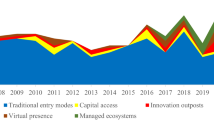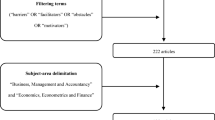Abstract
There is a wide literature about business incubators (BIs), especially about successful cases in high tech and knowledge intensive industries. Despite that, there is neither a viable integrative theory of effective business incubation nor clear guidelines about the preconditions for establishing BIs and their management. Such theory and guidelines are urgently needed because there is increasing evidence in the literature that, despite many successful cases and public policies supporting business incubation, most of BIs are not successful at all and serious doubts have emerged about the general effectiveness of business incubation and the advisability of investing public money in it. Based on a systematic literature review of the poor and scattered theoretical knowledge of effective business incubation, general principles are proposed to decide when a BI should be established and what it should do to be effective. The research is limited to non-profit BIs whose main goal is regional economic development as they represent the overwhelming majority of operating BIs.
Similar content being viewed by others
References
Aernoudt R (2004) Incubators: tool for entrepreneurship? Small Bus Econ 23(2):127–135
Allen D, McCluskey R (1990) Structure, policy, services, and performance in the business incubator industry. Entrepr Theory Pract 15(2):61–77
Abburrà L, Grandi A, Grimaldi R (2003) Il ruolo degli incubatori nella creazione di nuove imprese. Rosenber & Sellier, Bologna
Asian Association of Business Incubators—AABI (2010) www.aabi.info. Last accessed 4 Dec 2010
Association of German Business Incubators—ADT (2010) www.adt-online.de/homepage.html. Last accessed 4 Dec 2010
Bearse Peter (1998) A question of evaluation: NBIA’s impact assessment of business incubators. Econ Dev Q 12:322–333
Bee E (2004) Small business vitality and economic development. Econ Dev J 3(3):7–15
Bergek A, Norrman C (2008) Incubator best practice: a framework. Technovation 28:20–28
Bøllingtoft A, Ulhøi J (2005) The networked business incubator—leveraging entrepreneurial agency? J Bus Ventur 20(2):265–290
Burnett H, McMurray A (2008) Exploring business incubation from a family perspective: how start-up family firms experience the incubation process in two Australian incubators. Small Enterp Res 16(2):60–75
Carayannis EG, von Zedtwitz M (2005) Architecting gloCal (global–local), real-virtual incubator networks (G-RVINs) as catalysts and accelerators of entrepreneurship in transitioning and developing economies: lessons learned and best practices from current development and business. Technovation 25(2):95–110
Colombo M, Delmastro M (2002) How effective are technology incubators? Evidence from Italy. Res Policy 31:1103–1122
Corley K, Gioia D (2011) Building theory about theory building: what constitutes a theoretical contribution. Acad Manag Rev 36(1):12–32
Curley M, Formica P, Nicolò V (2011) From entrepreneurial fission to entrepreneurial fusion, achieving interaction resonance in a micro-innovation ecology. Ind High Educ 25(1):1–6
David R, Han S-K (2004) A systematic assessment of the empirical support for transaction cost economics. Strateg Manag J 25:39–58
Ferguson R (2004) Why firms on science parks should not be expected to show better performance—the story of twelve biotechnology firms. Int J Technol Manag 28:470–482
Ghoshal S, Moran P (1996) Bad for practice: a critique of the transaction cost theory. Acad Manag Rev 21(1):13–47
Gstraunthaler T (2010) The business of business incubators: an institutional analysis—evidence from Lithuania. Balt J Manag 5(3):397–421
Hackett S, Dilts D (2004) A systematic review of business incubation research. J Technol Transf 29:55–82
Hackett S, Dilts D (2004) A real options-driven theory of business incubation. J Technol Transf 29(1):41–54
Hackett S, Dilts D (2008) Inside the black box of business incubation: study B-scale assessment, model refinement, and incubation outcomes. J Technol Transf 33(5):439–471
Hansen M, Chesbrough H, Nohria N, Sull D (2000) Networked incubators. Hothouses of the new economy. Harv Bus Rev 78(5):74–84
Hughes M, Hughes P, Morgan RE (2007) Exploitative learning and entrepreneurial orientation alignment in emerging young firms: implications for market and response performance. Br J Manag 18(4):359–375
Jones R, Kashlak R, Jones A (2004) Knowledge flows and economic development through microenterprise collaboration in third-sector communities. New England J Entrep 7(1):39–48
Knopp L (2007) 2006 state of the business incubation industry. NBIA, Athens
Kučinskienė M, Fominienė A (2010) Verslo inkubavimo proceso transformacijos didejančios konkurencijos sąlygomis (Lithuanian). Curr Issues Bus Law 5:110–122
Leblebici H, Shah N (2004) The birth, transformation and regeneration of business incubators as new organisational forms: understanding the interplay between organisational history and organisational theory. Bus Hist 46(3):353–380
Lender C, Dowling M (2007) The organisational structure of university business incubators and their impact on the success of start-ups: an international study. Int J Entrep Innov Manag 7(6):541–555
Luger Michael, Goldstein Harvey (1991) Technology in the garden. Research parks & regional economic development. University of North Carolina Press, Chapel Hill
Maital Shlomo, Ravid Shmuel, Seshadri DVR, Dumanis Alon (2008) Toward a grounded theory of effective business incubation. Vikalpa: J Decis Makers 33(4):1–13
Markman G, Phan P, Balkin D, Gianiodis P (2005) Entrepreneurship and university-based technology transfer. J Bus Ventur 20(2):241–263
Monck CSP, Porter B, Quintas P, Storey DJ, Wynarczyk P (1988) Science parks and the growth of high-technology firms. Croom Helm, London
National Business Incubation Association—NBIA (2010) www.nbia.org. Last accessed 4 Dec 2010
National Business Incubation Association—NBIA (2003) 2002 state of the business incubation industry. NBIA, Athens
Newbert S (2007) Empirical research on the resource-based view of the firm: an assessment and suggestion for future research. Strateg Manag J 28:121–146
Oviatt B, McDougall PP (1994) Toward a theory of international new ventures. J Int Bus Stud 25(1):45–64
Phillips R (2002) Technology business incubators: how effective as technology transfer mechanisms? Technol Soc 24:299–316
Povilaitis M, Čiburienė J (2007) Paslaugų inovacijos ir jų įvertinimo galimybės (Lithuanian). Econ Manage 826–832
Rennie M (1993) Global competitiveness: born global. McKinsey Q 4:45–52
Rice M (2002) Co-production of business assistance in business incubators: an exploratory study. J Bus Ventur 17(2):163–187
Riddle L, Hrivnak G, Nielsen T (2010) Transnational diaspora entrepreneurship in emerging markets: bridging institutional divides. J Int Manag 16(4):398–411
Rothaermel F, Thursby M (2005) Incubator firm failure or graduation? The role of university linkages. Res Policy 34(7):1076–1090
Scaramuzzi Elena (2002) Incubators in developing countries: status and development perspectives. infoDev Program. The World Bank, Washington, DC
Schumpeter J (1942) Capitalism, socialism and democracy. Unwin University Books, London
Siegel D, Westhead P, Wright M (2003) Science park and the performance of new technology-based firms: a review of recent U.K. evidence and an agenda for future research. Small Bus Econ 20:177–184
Singh R, Jain R (2003) Improving local economies through technology transfer: utilising incubators to facilitate cluster development. Int J Technol Transf Commer 2(3):249–262
Sternberg R, Behrendt H, Seeger H, Tamásy C (1997) Bilanz eines Booms—Wirkungsanalyse von Technologie- und Gruenderzentren in Deutschland, 2nd edn. Dortmunder Vertrieb für Bau- und Planungsliteratur, Dortmund
Tamàsy C (2007) Rethinking technology-oriented business incubators: developing a robust policy instrument for entrepreneurship, innovation, and regional development? Growth Change 6(3):460–473
Todorovic Z, Suntornpithug N (2008) The multi-dimensional nature of university incubators: capability/resource emphasis phases. J Enterp Culture 16(4):385–410
Tsai Fu-Sheng, Hsieh L, Fang S-C, Lin J (2009) The co-evolution of business incubation and national innovation systems in Taiwan. Technol Forecast Soc Chang 76(5):629–643
UK Business Incubation—UKBI (2010) www.ukbi.co.uk. Last accessed 4 Dec 2010
United Nations—UN (2000) Best practice in business incubation. Economic Commission for Europe. United Nations, New York, p 27
Westhead P, Storey DJ (1994) An assessment of firms located on and off science parks in the UK. HMSO, London
Westhead Paul (1997) R&D “inputs” and “outputs” of technology-based firms located on and off science Parks. R&D Manag 27:45–62
Nam Young-Ho (2000) The roles of incubator organizations in hi-tech venture creation in Korea. Asia Pacific J Manag 17(2):277–296
Author information
Authors and Affiliations
Corresponding author
Rights and permissions
About this article
Cite this article
Tavoletti, E. Business Incubators: Effective Infrastructures or Waste of Public Money? Looking for a Theoretical Framework, Guidelines and Criteria. J Knowl Econ 4, 423–443 (2013). https://doi.org/10.1007/s13132-012-0090-y
Received:
Accepted:
Published:
Issue Date:
DOI: https://doi.org/10.1007/s13132-012-0090-y




